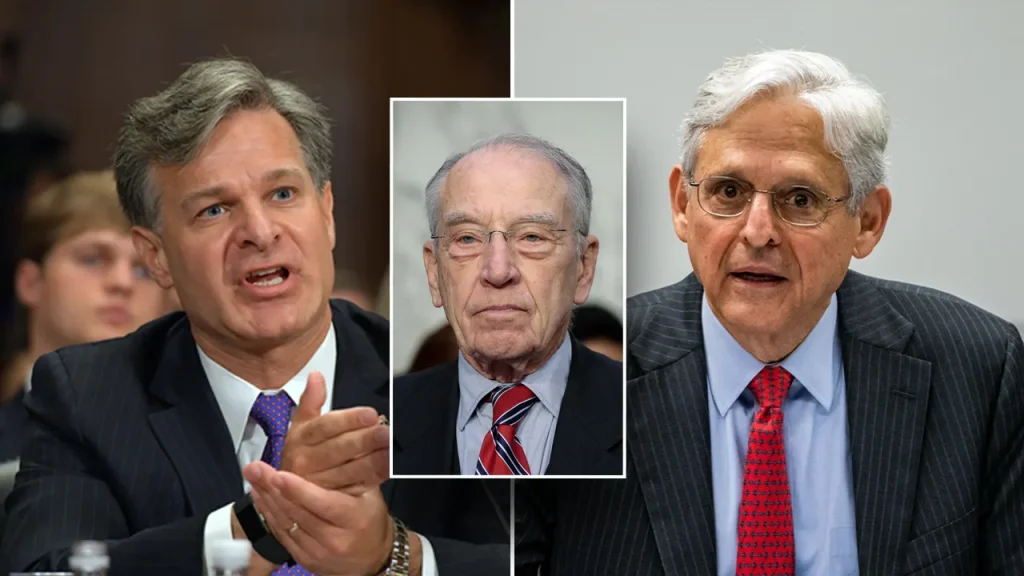Biden Administration Justice Department’s Investigation into Trump Associates Revealed
In a significant disclosure that has sparked controversy in Washington, Senator Chuck Grassley of Iowa released a previously confidential Justice Department memo from April 2022 detailing high-level authorization for an FBI investigation into Trump campaign associates. The document reveals that then-Attorney General Merrick Garland, Deputy Attorney General Lisa Monaco, and FBI Director Christopher Wray personally approved what became known internally as “Arctic Frost” – an investigation into alleged efforts to obstruct Congress’s certification of the 2020 election results. Grassley, in sharing the document on social media, characterized it as evidence of “unchecked government power at the highest levels” being deployed against political opponents.
The four-page memorandum, bearing the signatures of all three top Justice Department officials, authorized the FBI’s Washington Field Office to open a “Sensitive Investigative Matter” focused on potential criminal conspiracy. According to the document, the investigation centered on “fraudulent certificates of electors’ votes” that were submitted to the National Archivist, purportedly representing legitimate electoral votes from five battleground states: Arizona, Georgia, Michigan, Nevada, and Wisconsin. The memo’s executive summary states that “open source reporting and public statements made by individuals closely associated with Donald J. Trump, Inc. (Trump Campaign) present an articulable factual basis indicating the existence of a federal crime,” which formed the foundation for opening a full investigation. The document reveals the chain of approval, with Monaco endorsing the investigation to Garland with a handwritten note reading “Merrick – I recommend you approve,” before both officials signed off on April 5, 2022.
This authorization occurred in a politically charged context – more than a year after the January 6, 2021, Capitol riot but months before the appointment of Special Counsel Jack Smith, who would later take over related investigations. The memo appears to document early stages of the Justice Department’s examination of the so-called “fake electors” scheme that became central to Smith’s subsequent investigation into alleged efforts to overturn the 2020 election results. The investigation eventually expanded in scope, with revelations that in 2023, Smith subpoenaed phone records belonging to multiple Republican lawmakers, including eight senators and at least one House member, covering the critical four-day period surrounding the Capitol riot (January 4-7, 2021). While these subpoenas reportedly sought only metadata – including numbers called, dates, and durations – rather than call content, they targeted prominent Republican figures including Senators Marsha Blackburn, Josh Hawley, and Lindsey Graham.
The scope of data collection has continued to grow, with Senator Ted Cruz of Texas recently claiming that Smith also attempted to subpoena his phone records, though Cruz stated his carrier, AT&T, did not comply with the request. This expanding investigation has provoked strong reactions along partisan lines, with Republican lawmakers characterizing the probe as political surveillance reminiscent of the Watergate scandal. Smith’s legal team has vigorously defended the investigation’s methods, maintaining that the record requests were “entirely proper” and narrowly tailored to support their investigation into potential efforts to subvert the election certification process. In communications with Senator Grassley, Smith’s lawyers emphasized that such subpoenas comply with Justice Department policy and represent routine investigative practices rather than improper surveillance.
The controversy highlights deep divisions over the propriety of investigating elected officials in connection with the events of January 6th. Smith’s legal team has pushed back against accusations from former Trump administration official Kash Patel, who claimed the subpoenas were deliberately hidden from oversight. The special counsel’s attorneys noted that the requests were actually referenced in a footnote of Smith’s final investigative report and had been shared with Trump’s defense team during the discovery process. This disclosure, they argue, demonstrates transparency rather than concealment. Nevertheless, Republican lawmakers continue to express outrage at what they view as politically motivated investigation of members of Congress who were legally challenging electoral votes – a process they maintain is protected under constitutional provisions.
Senator Grassley’s decision to release this document publicly represents the latest chapter in ongoing partisan battles over the Justice Department’s handling of investigations related to the 2020 election and its aftermath. By characterizing the probe as an abuse of power and promising continued oversight, Grassley signals that Republican lawmakers intend to scrutinize the origins and conduct of these investigations, particularly as the 2024 presidential election approaches. The tension between legitimate law enforcement activity and concerns about politically motivated investigations continues to divide Washington, with each side viewing the same facts through dramatically different lenses. As investigations continue to unfold, these disputes over the proper boundaries of prosecutorial power when applied to political figures remain unresolved, reflecting broader disagreements about accountability, oversight, and the rule of law in American democracy.













